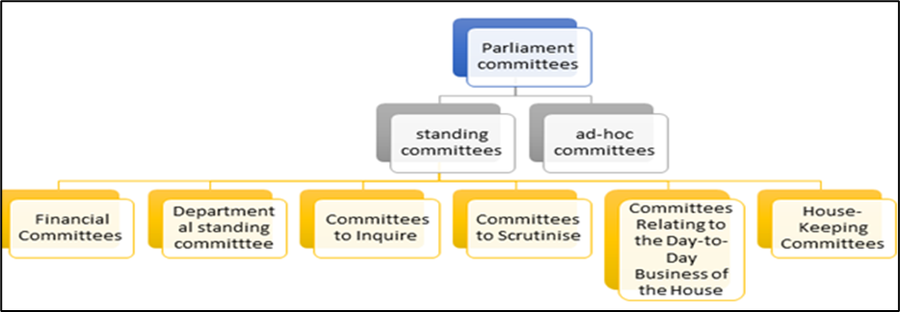Mains Daily Question
April 13, 2023
What are the challenges faced by parliamentary committees in India and how can they be addressed to improve the effectiveness of the Parliamentary System?
Approach:
Introduction: Define the role of parliamentary committees briefly by mentioning their role in the functioning of the parliamentary system.
Body: Identify common challenges faced by parliamentary committees. Thereupon Discuss potential solutions to these challenges.
Conclusion: Conclude the answer by reestablishing its significance in safeguarding democracy in modern times.
Answer:
Parliamentary committees in India are panels of MPs that are appointed, elected or nominated by the House or the Speaker/Chairman. They play a vital role in ensuring the smooth functioning of the parliamentary system and allow for the participation of all voices in the legislative process.
They scrutinize legislation, identify potential issues, and provide suggestions for improvement and can also investigate important issues that may not hold much political significance. Due to their structure and functions, they are also called “Mini Parliament”.
Types of Parliamentary Committees:
Challenges faced by parliamentary committees:
- Poor referral rate: As per data from PRS in the 17th Lok Sabha, only 14 Bills have been referred for further examination so far. Similarly around 25% of the Bills introduced were referred to committees in the 16th Lok Sabha, as compared to 71% and 60% in the 15th and 14th Lok Sabha respectively.
- Recommendatory nature: Parliamentary committees in India do not have adequate powers to enforce their recommendations. The committees can only make recommendations to the parliament, and it is up to the government to act upon them.
- Shortage of time and resources to undertake comprehensive studies. As a result, committees may not be able to conduct an in-depth analysis of issues, and their recommendations may not be based on solid evidence.
- Lack of expertise: Parliamentary committees in India are comprised of MPs who may not have the required expertise to examine technical and specialized issues.
- Partisan allegations: The composition of parliamentary committees reflects the political representation of the parliament, which means that members may approach issues from a partisan perspective.
Solutions to address these challenges:
- Adopting USA Model: In the US, committees play a crucial role in scrutinizing bills post-introduction, allowing changes to be made before the modified bill goes for voting.
- Establishing New Committees: Given the increasing complexity in matters of economy and technological advancement there is a need for setting up new parliamentary committees. For instance, a Standing Committee on National Economy can provide analysis of the national economy with resources for advisory expertise, data gathering, and research facilities. A Standing Committee on Legislation can oversee and coordinate legislative planning.
- Compulsory Referral: The Parliament could consider compulsory referral, for the Bills that are tabled on the floor, to the appropriate committees. Arming them with more powers will help them ensure accountability from the executive instead of making them toothless tigers.
- Pre-emptive scrutiny: Standing Constitution Committee to scrutinise Constitutional Amendment Bills before they are introduced in Parliament.
- Greater Weightage to Public Account Committee: The recommendations of the PAC should be accorded greater weight and they must be treated as the “conscience-keepers of the nation in financial matters.”
- Periodic Review: According to the National Commission to Review the Working of the Constitution (NCRWC), DRSCs (Department-Related Standing Committees) should be periodically reviewed so that the committees which have outlived their utility can be replaced with new ones.
Through their expertise and oversight, these committees help to strengthen the democratic spirit and promote transparency and accountability in the legislative process. Parliamentary committees continue to be empowered and supported so that they can carry out their responsibilities effectively and ensure that the laws passed to serve the best interests of the Indian democracy.


